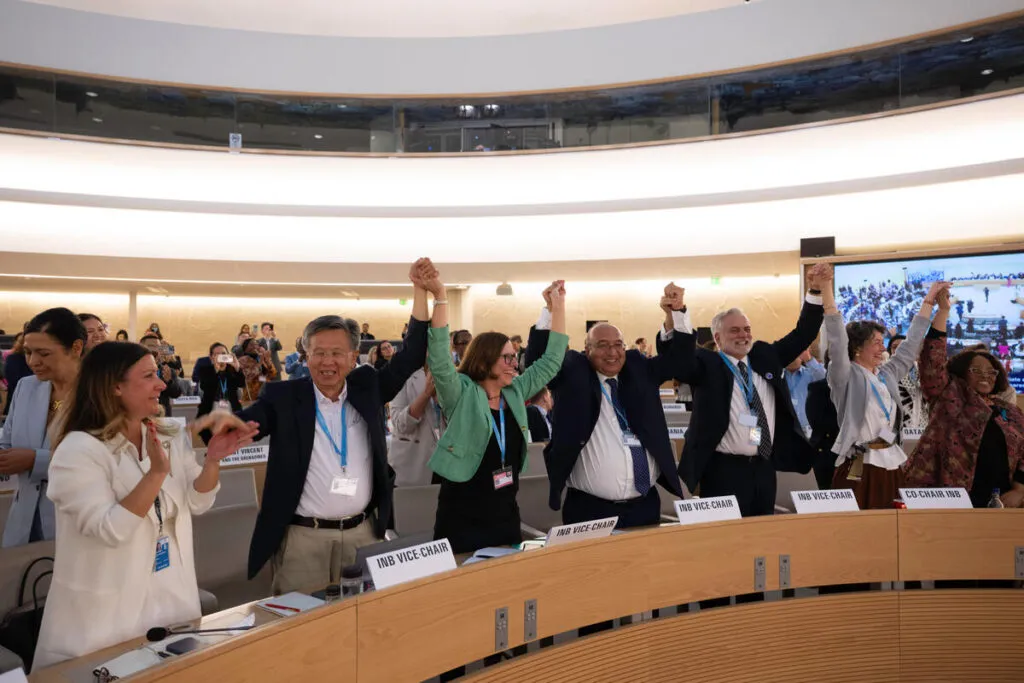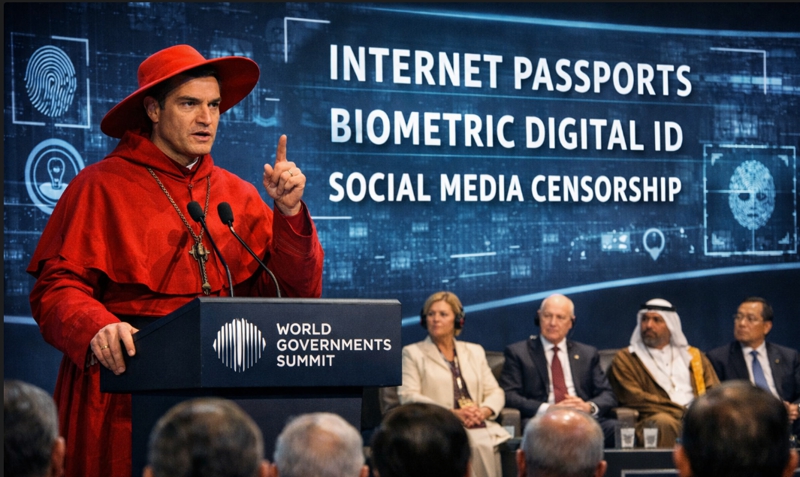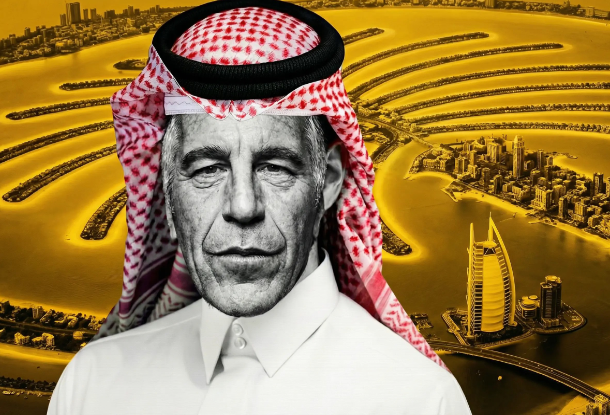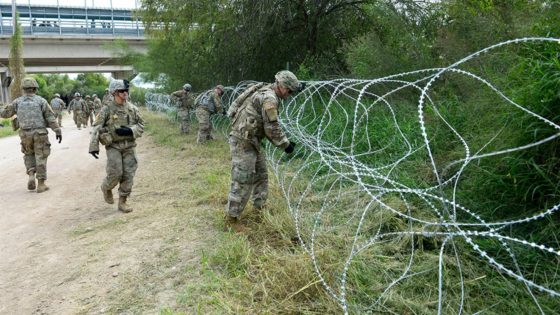BRICS is 45% of the world’s population. This means BRICS cares about you
On May 20, the 78th World Health Assembly “adopted” the Pandemic Agreement. Adopted is in scare quotes because the WHA rubber-stamped an agreement that hadn’t been finalized. In other words, WHO member states agreed by consensus (without voting) to “adopt” an incomplete document.
It was historic (source: WHO). Gavi, the Bill Gates-funded vaccine alliance, hailed the completion of the incomplete Pandemic Agreement as a “powerful testament to the strength of multilateralism and shared commitment to global health” and welcomed “the recognition of immunization as a vital tool to prevent pandemics and save lives in this agreement.”
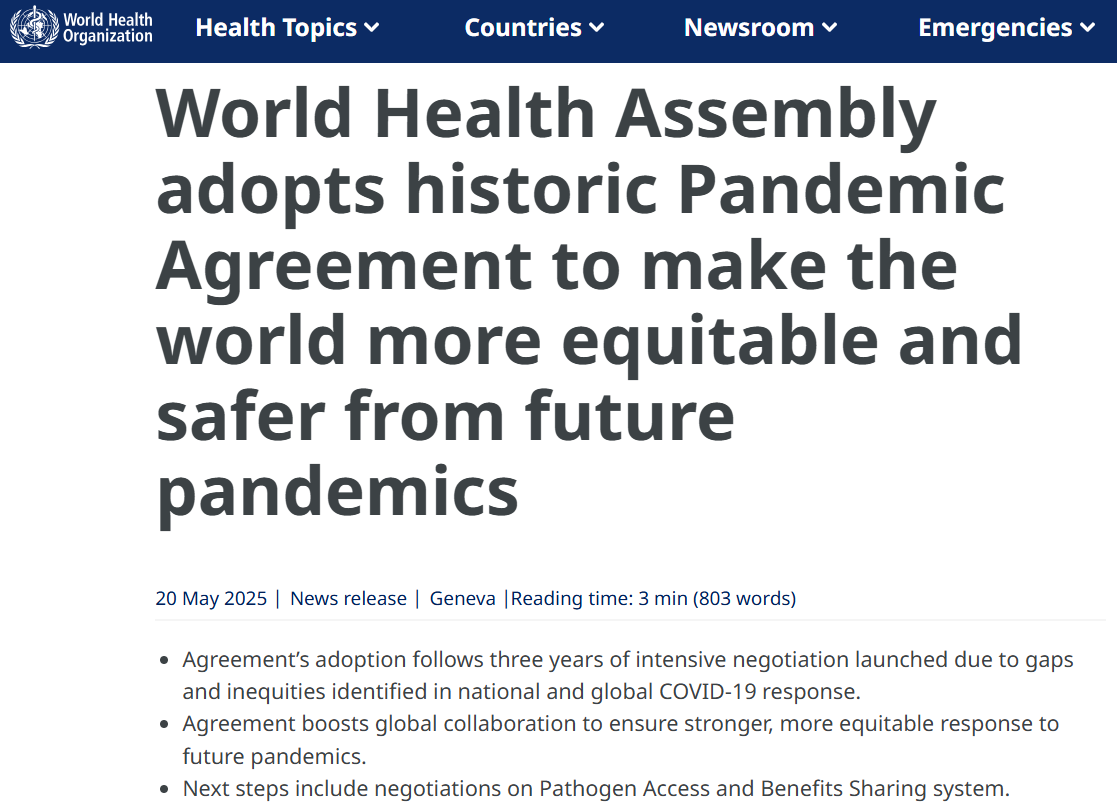
But there were a few party-poopers. A day before being “adopted” without a vote, the agreement was put to the ultimate test: a committee vote in which not a single member state voted Nay: 124 states were in favor, with 11 abstentions (Bulgaria, Egypt, Iran, Israel, Italy, Jamaica, The Netherlands, Paraguay, Poland, Russia, and Slovakia.)
Probably like me you are surprised that this fraudulent agreement was able to sneak past the vast majority of BRICS states undetected, and that not a single member of the Multipolar World Order voted against it. What could this mean? I did some research on how the original BRICS bloc, plus the new BRICS members who abstained (Egypt and Iran), felt about this horrible trash-agreement.
Brazil
Brazil called for the “full and timely implementation” of the Pandemic Agreement, describing the treaty as a “historic milestone for global health, and a powerful reaffirmation of multilateralism in a time of growing cultural-political tension and fragmentation.”
The Brazilian delegation added: “President Lula, speaking at the UN General Assembly 2024, called for an urgent conclusion to this agreement, and today we celebrate not the end of the negotiations, but the beginning of a new global commitment to cooperation, equity and shared resilience.”
India
India praised the “adoption” of the Pandemic Agreement as a “collective reaffirmation of our shared responsibility to protect humanity from future health crises.”
The BRICS state highlighted its own contributions to the agreement, noting that it had “co-facilitated the preparation of articles on pandemic prevention and surveillance and the One Health approach to pandemic prevention, preparedness and response.”
China
The Chinese delegation said Beijing had played “an important role in helping reach consensus” that led to the agreement’s adoption.
Xia Gang, deputy director of China’s National Disease Control and Prevention Administration, said he believed the Pandemic Agreement would “help promote the equitable distribution of technology, funding and resources and support developing countries in strengthening their capacity to detect and respond to pandemics.” Xia cited “China’s constructive participation in the negotiations of the pandemic treaty” as a “prime example” of Beijing’s active participation in “global public health governance”.
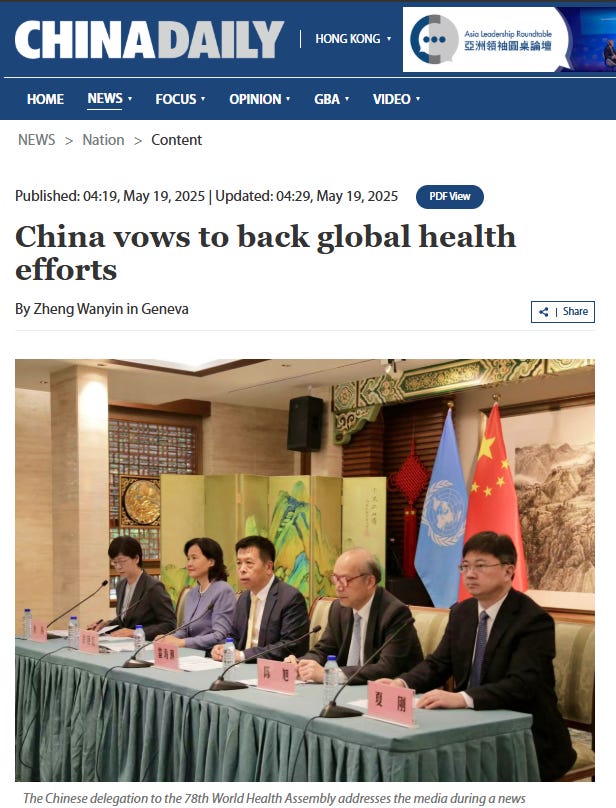
In an address before the WHA plenary session on May 20, Chinese Vice Premier Liu Guozhong called on WHO member states to “firmly support” the World Health Organization’s leading role in coordinating “global public health governance”, adding that special attention should be given to ensuring equitable “vaccine distribution”:
Five years ago, Chinese President Xi Jinping called on all countries to join hands in building a global community of health for all at the 73rd World Health Assembly, Liu said. China has firmly honored this commitment with concrete actions as the international community widely recognizes China’s role in and contributions to combating the COVID-19 pandemic, he added.
Noting that global public health security is now facing significant challenges under the impact of unilateralism and power politics, Liu emphasized that China has always put people and their lives first, implemented a health-first strategy, actively participated in global health governance, and promoted the building of a global community of health for all.
The international community should uphold multilateralism, firmly support the World Health Organization (WHO) in playing its leading and coordinating role in global public health governance, uphold fairness and equity, and firmly support the legitimate demands of developing countries in areas such as public health arrangements, vaccine distribution and technology transfer, he said.
He also announced that China would pledge an additional $500 million over the next five years to the World Health Organization.
Chinese state media said the “historic” Pandemic Agreement will allow for “rapid sharing of data about new diseases, the distribution of medical resources to the WHO in the event of a future outbreak, and the transfer of health technologies to poorer nations.”
“The system will address how countries — especially underdeveloped ones — could benefit from sharing pathogens with pandemic potential, particularly in exchange for pharmaceutical products, if such are developed by drugmakers,” wrote China Daily.
South Africa
The South African delegation argued that the “COVID-19 pandemic” had demonstrated “the urgent need for an international framework to forge a stronger and equitable global health architecture to prevent, prepare for, and respond to future pandemics.” South Africa advocated for the “swift implementation” of the “landmark” Pandemic Agreement, which would mark a “crucial step towards achieving a safer, healthier and more resilient world for all.”
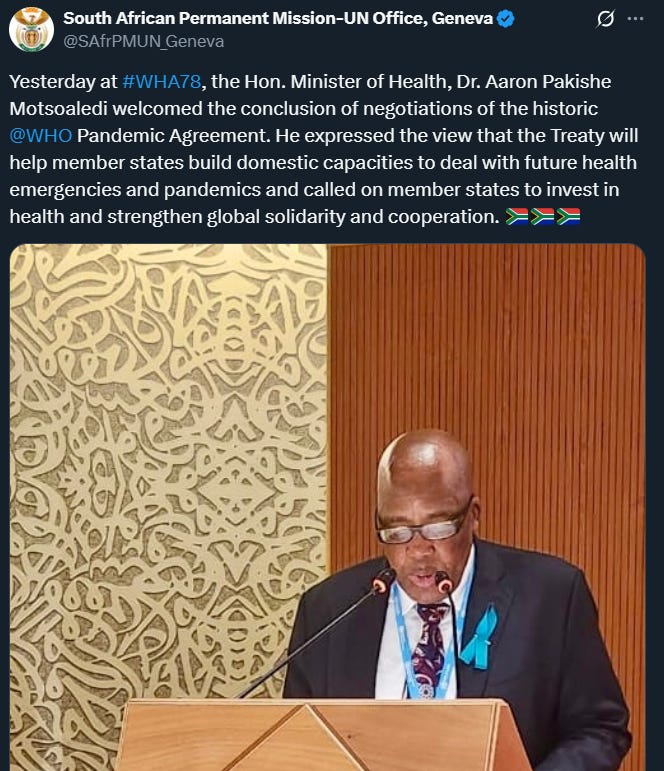
Demonstrating his country’s commitment to the treaty’s implementation, President Cyril Ramaphosa told WHA member states that South Africa would use its G20 presidency to champion “pandemic prevention, preparedness, and response.”
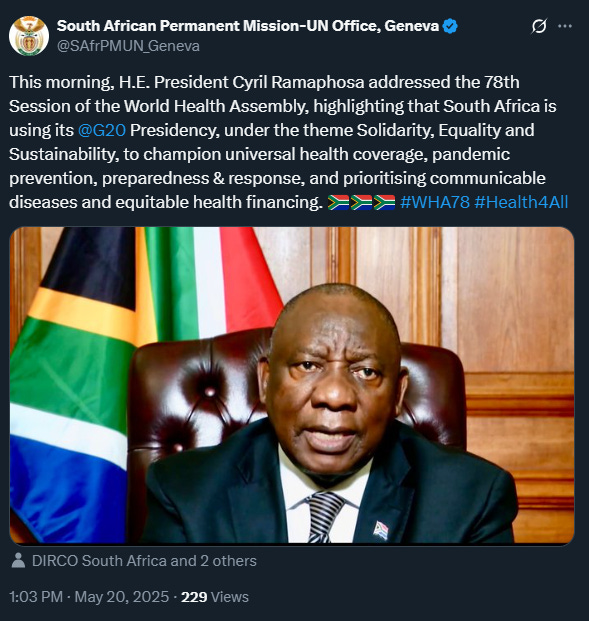
Egypt
Concerned by “opaque behavior by some parties prior to the decision”, Egypt abstained when the Pandemic Agreement was put to a vote in Committee A.
Despite its misgivings over protocol, the Egyptian delegation expressed hope that the agreement would “become a tool of empowerment, a shield of equity and a symbol of what multilateralism can achieve when anchored in distrust.”
Iran
The Iranian delegation issued an explanatory note after it abstained from voting on the agreement:
While we appreciate the efforts of the WHO and INB Co-Chairs, we remain concerned that key priorities of developing countries have not been adequately addressed.
Article 12 and its Annex, which are essential for implementation, are still under negotiation. Without them, the agreement cannot be considered final. We also regret the lack of binding commitments on unhindered and equitable access to medical countermeasures, technology transfer, and know-how, as well as the continued silence on the negative impact of unilateral coercive measures on health systems.
Although it viewed the current version of the treaty as “incomplete, unfinished, and non-conclusive,” Iran expressed “readiness to engage constructively in future negotiations aimed at finalizing the instrument.”
Russia
Russia was the only founding BRICS member to abstain from the Committee A vote.
The reason it abstained differs depending on which explanation you read.
For example, in an interview a month before the WHA convened, Russian Permanent Representative to the UN Office in Geneva, Ambassador Gennady Gatilov, told TASS:
[I[t is already known that a number of countries, including the United States, Argentina, and Slovakia, do not intend to join the agreement. Therefore, it is difficult to speak of the formation of a strong, universally accepted foundation for multilateral cooperation in pandemic preparedness and response. Much work still lies ahead.
To summarize, in any case, effective pandemic response requires, above all, unity within the global community and genuine commitment from all stakeholders, including the private sector, to constructive cooperation based on the principles of solidarity, fairness, and respect for national sovereignty. Regrettably, this has not yet been achieved.
So Moscow has reservations because members of the collective West have not shown “genuine commitment” to the agreement? No! Moscow abstained because the collective West is trying to use the Pandemic Agreement for its own interests.
In response to the Committee A vote on the treaty, the Russian delegation said that the COVID-19 pandemic had “demonstrated that the Global South is vulnerable to the frauds of the collective West and its pharmaceutical giants,” prompting the need for a “more fair” pandemic response instrument.
While supportive of the treaty in principle, the Russian delegation criticized “attempts to impose approaches and standards that do not enjoy universal support, to turn the Agreement into a mechanism of coercion, external control and lobbying for the interests of the industry of individual states.”
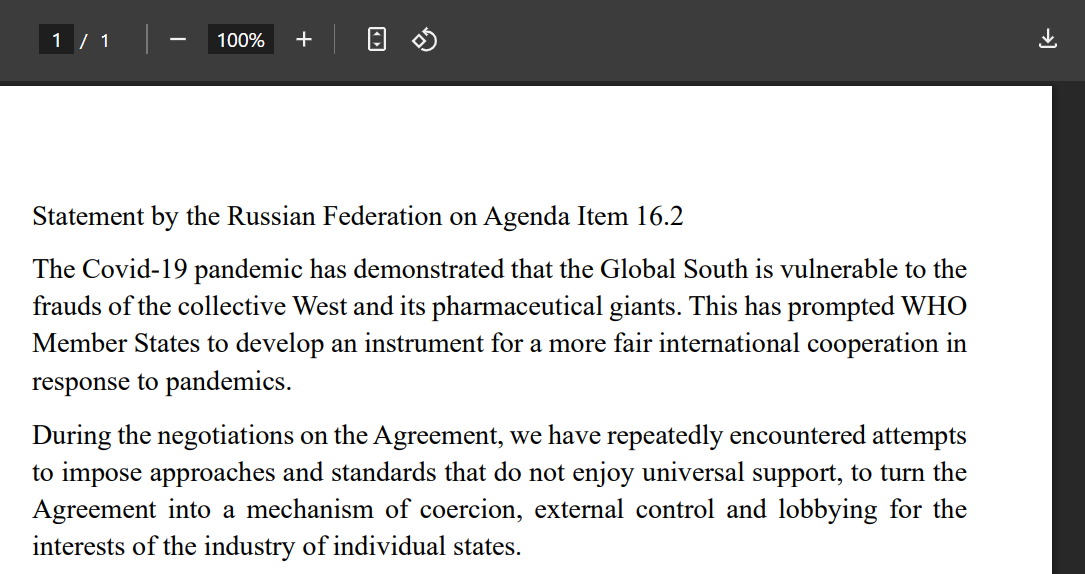
After the agreement was formally “adopted”, the Russian delegation wrote:
In explanation of [our] position after the vote, [we] emphasized that the Russian Federation builds its emergency health response based on the interests of the Russian people, national priorities in public health protection, domestic laws, rules, and standards, and in accordance with the Constitution of the Russian Federation.
The adoption of the resolution by the WHA does not mean that countries are joining the Agreement – much less that its implementation has begun.
The Agreement will not be open for signature until the Annex on the “Pathogen Access and Benefit-Sharing System” is developed and approved by the WHA.
Stressing its commitment to “building a multipolar international system”, Moscow pledged to “increase assistance to the states of the Global South, based on their needs and without imposing political conditions, with the aim of partner countries gaining genuine independence and sovereignty in protecting the health of their populations from the threat of infections.”
Is this the same “historic milestone for global health” (Brazil), the “collective reaffirmation of our shared responsibility to protect humanity from future health crises” (India), the “historic” agreement “reached by consensus” (China), the “crucial step towards achieving a safer, healthier and more resilient world for all” (South Africa)? Why is Russia being such a BRICS-downer?
Russia: Protecting the Global South from “the frauds of the collective West and its pharmaceutical giants”?
Naturally, one can’t help but applaud a statement like, “The COVID-19 pandemic has demonstrated that the Global South is vulnerable to the frauds of the collective West and its pharmaceutical giants.”
But the Russian delegation’s statement is missing some important context: Moscow actively participated in, and profited from, “the frauds of the collective West and its pharmaceutical giants” aimed at the Global South during COVID. Putin himself described Russia’s partnership with Western pharmaceutical giants as an example of “unification of efforts” promoted by the World Health Organization.
On December 21, 2020, the Kremlin held a videoconference to mark the signing of an agreement between the Gamaleya Center (the developer of Sputnik V), AstraZeneca, the Russian Direct Investment Fund (Russia’s sovereign wealth fund), and Russian pharmaceutical firm R-Pharm, to strengthen cooperation and conduct joint studies of a Sputnik V-AstraZeneca COVID vaccine “cocktail”.
Russian President Vladimir Putin commended the project as a shining example of “implementing the recommendations of the WHO” in the fight against COVID:
Today, I am pleased to note that it is Russian scientists, our investment structures, and representatives of the partner company AstraZeneca, who are practically implementing the recommendations of the World Health Organization. Today, you are doing what has already been repeated many times by representatives of the WHO – the World Health Organization. They called and still call for a unification of efforts. And you, dear colleagues and friends, are showing an example of leadership in uniting international efforts, thereby bringing victory over this dangerous virus closer. […]
I would like to note that AstraZeneca has been working on the Russian market for several years, successfully implementing a number of investment projects, I know that they even built a factory, investing in joint research and personnel training. […]
I am confident that the cooperation between Russian colleagues and AstraZeneca will allow us to achieve a breakthrough not only in work on vaccines, but also on a whole line of other vital drugs.
Addressing AstraZeneca CEO Pascal Soriot, Putin added:
I want to wish you success not only on the Russian market, but also on global markets, and express hope that the new year will be favorable for your company and for solving the problems we are talking about now.
The partnership between the Russian government and AstraZeneca began in July 2020, nearly a month before Russia unveiled Sputnik V, “the world’s first registered COVID vaccine”. In a July 17, 2020 press release, R-Pharm announced it had received a “cell line and adenoviral vector” from AstraZeneca that would be used to produce the British-Swedish vaccine in Russia:
Russia will be one of the hubs for the production and supply of the vaccine to international markets. It is expected that exports will be organized to more than 30 countries around the world, including the Middle East, the Balkan region and the CIS countries.
AstraZeneca is confident that together with R-Pharm it will be able to provide the vaccine to millions of people in the most effective way.
At the time, R-Pharm had already partnered with RDIF to manufacture what would later be known as Sputnik V.
Russia began exporting AstraZeneca’s vaccine to nations of the Global South in September 2021, six months after European states began suspending the drug’s use over safety concerns. R-Pharm continued to export the British-Swedish shot until September 2022, when it suspended production due to “lack of demand.”
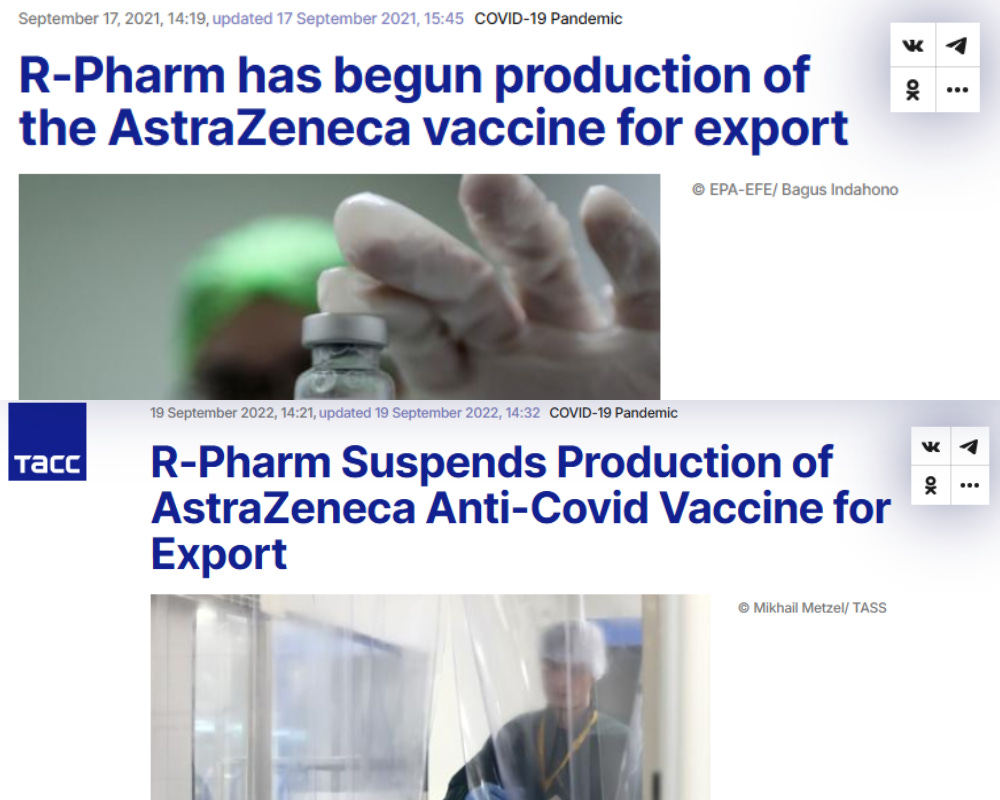
As AstraZeneca’s vaccine faced increasing scrutiny from western media and governments, Russia’s sovereign wealth fund rushed to its partner’s defense.
“The UK media and government must do a better job of protecting the reputation of AstraZeneca, a safe and effective vaccine that its competitors are constantly attacking through the media with facts taken out of context,” the Russian Direct Investment Fund said in a statement released on October 11, 2021.
RDIF’s solidarity with western big pharma wasn’t limited to white-knighting for AstraZeneca. On October 13, 2021, Russia’s sovereign wealth fund announced it was conducting joint research with Pfizer in hopes of developing more Sputnik V/Big Pharma combo shots.
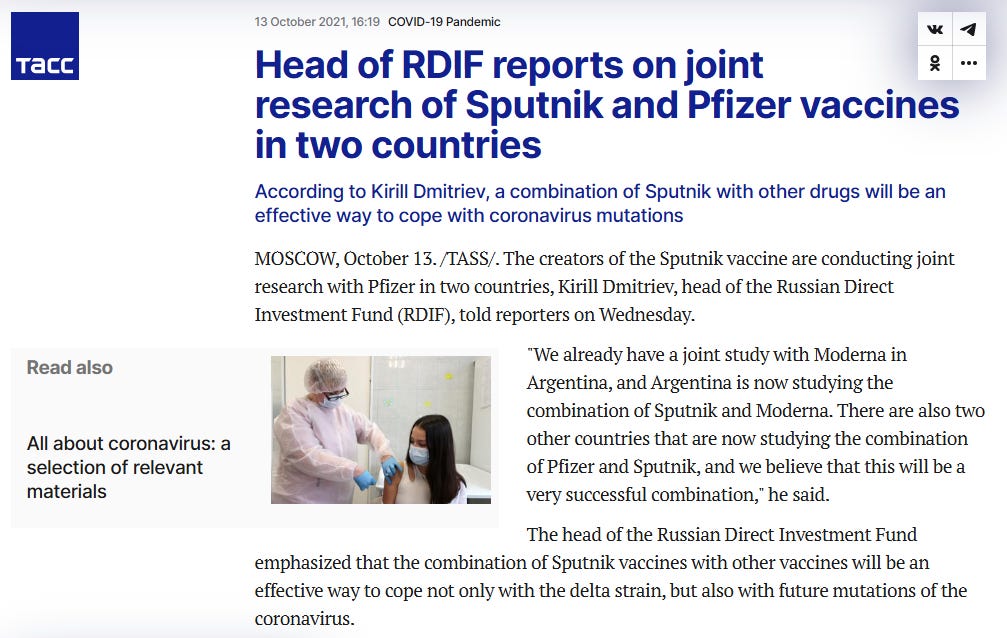
“We already have a joint study with Moderna in Argentina, and Argentina is now studying the combination of Sputnik and Moderna. There are also two other countries that are now studying the combination of Pfizer and Sputnik, and we believe that this will be a very successful combination,” Kirill Dmitriev, CEO of RDIF, said.
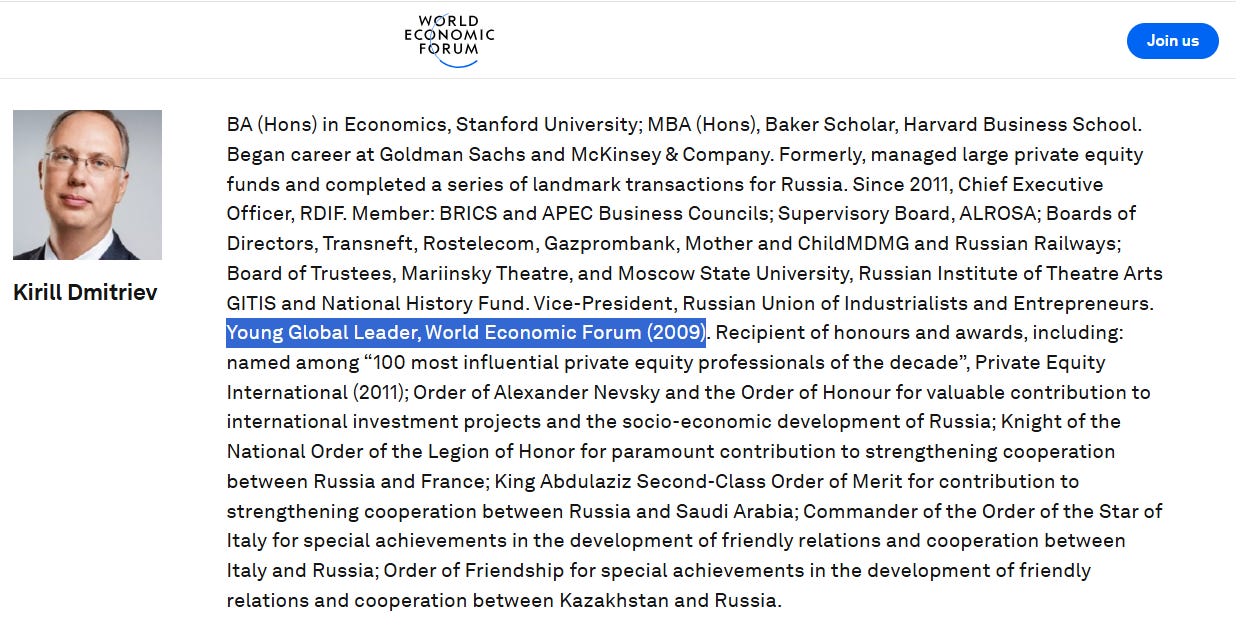
Is Moscow actually concerned about the frauds of western big pharma, or is it worried that when the next “pandemic” arrives, its trusted western partners won’t be as generous with the spoils? Does the Russian government oppose anti-human medical tyranny and biosecurity theater, or is it upset that a rival drug cartel is peddling clot-shots on turf that it has claimed for itself? Given Moscow’s active participation in the frauds of the collective West during COVID, it is unreasonable to interpret complaints about the Pandemic Agreement being used as a mechanism for “external control and lobbying for the interests of the industry of individual states” as: Where’s our cut?
To help answer these questions, let’s examine the Russian government’s “emergency health response based on the interests of the Russian people.”
“The interests of the Russian people”
Please email me if you have any evidence to suggests that, as the Russian delegation at the WHA claimed, “the Russian Federation builds its emergency health response based on the interests of the Russian people, national priorities in public health protection, domestic laws, rules, and standards, and in accordance with the Constitution of the Russian Federation.”
A few bullet points for your consideration (taken from this blog’s Origin Story, which you should read):
- In a country where 90% of the population opposed digital cattle tags, nearly every region in Russia adopted digital cattle tags.
- In a country where very few people were excited about Sputnik V, all 85 federal subjects introduced compulsory vaccination decrees, coercing tens of millions of Russians to get injected with unproven genetic slurries.
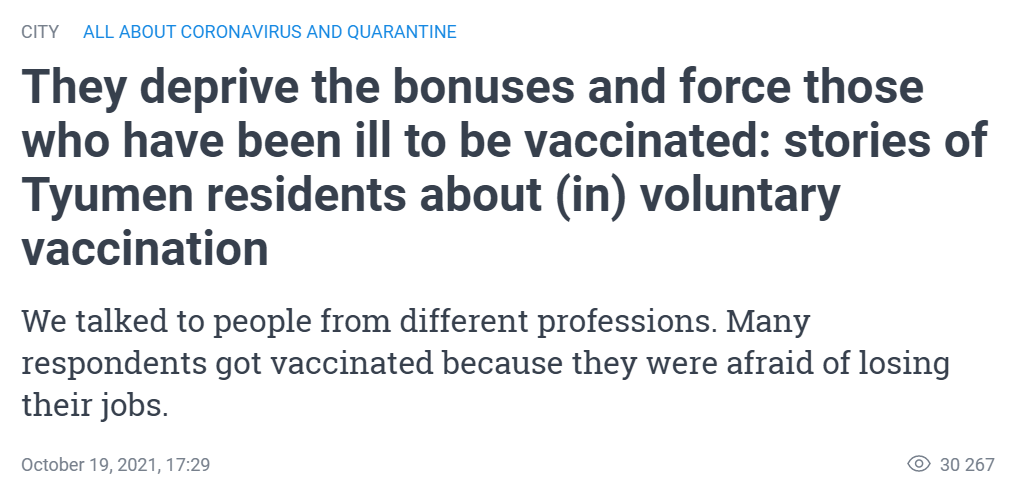
- In a country that was already suffering from the health-destroying effects of “healthcare optimization,” the Russian Health Ministry suspended routine medical care in order to reserve hospital beds for “COVID” patients—who were “treated” with toxic liver pills and HIV medications.
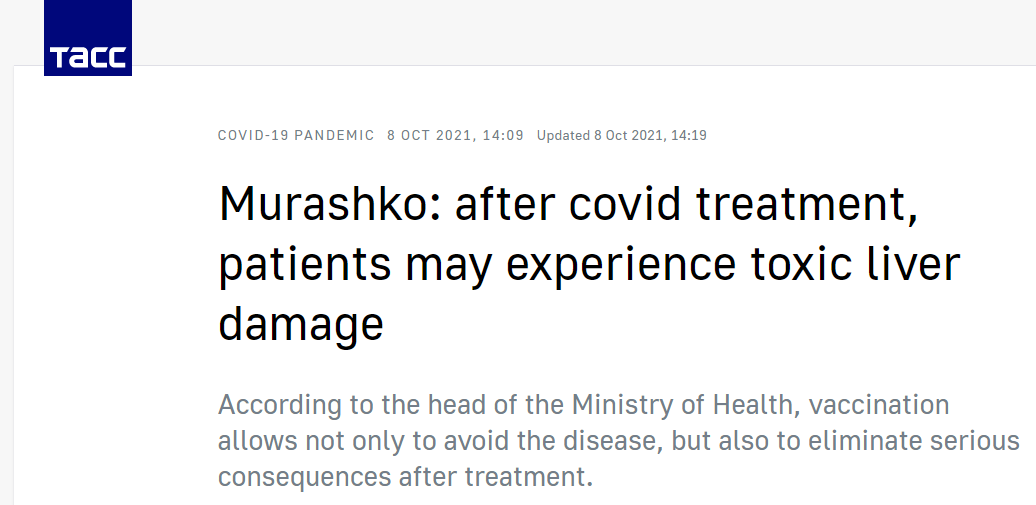

- The Russian government’s decision to suspend routine medical care to focus on “fighting coronavirus” had predictable results:
The authorities held back [COVID], which had very little effect on the increase in mortality, leaving those who really needed it without planned medical care. This was the reason for the huge increase in mortality, at least 200,000 “extra” deaths. We can now speak of this as a proven statistical fact.
- In 2021, at the height of coercive “public health” measures in Russia, the Russian Federation recorded a natural population decline of over 1.04 million people—an “anti-record” that surpassed the worst years of the socioeconomic destruction of the 90s; a figure so unthinkable that it hadn’t been seen since the end of the Great Patriotic War.
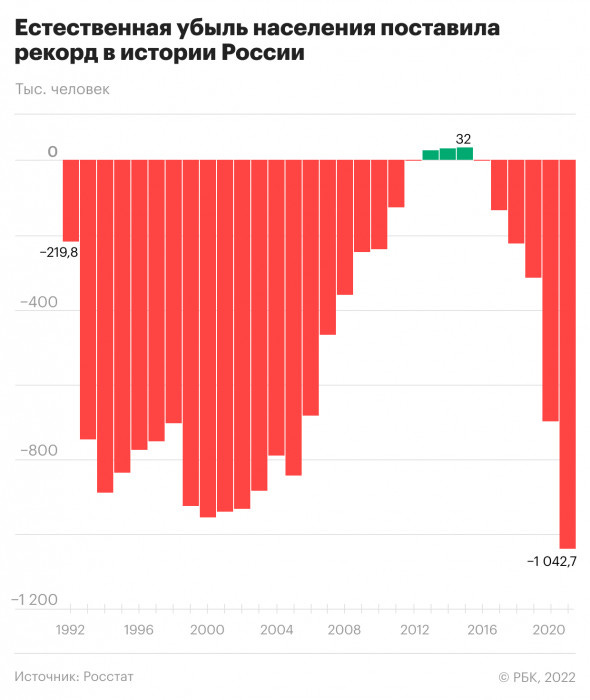
But here are some more recent developments concerning Moscow’s tireless efforts to “protect the interests of the Russian people”:
In February of this year, Russia’s Constitutional Court upheld the legality of mandatory COVID vaccination policies, implemented across Russia in autumn 2021, which forced millions of Russians to choose between getting vaccinated and being “indefinitely suspended” from work.
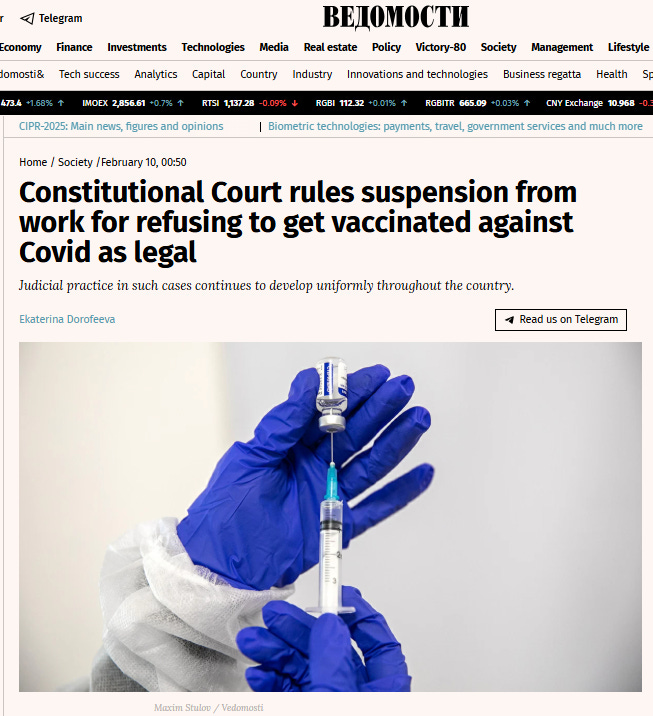
While mandatory vaccination orders were canceled in the first half of 2022, the legal framework for coercive medical intervention remains intact. The law “On the sanitary and epidemiological welfare of the population” requires Russian citizens to get vaccinated if ordered to do so by the country’s medical authorities.
Incredibly, there are Russians who still can’t return to work after refusing to get vaccinated in 2021. A report from February in Moskovskij Komsomolets detailed the case of a 39-year-old Muscovite who had been fighting for three years for reinstatement after losing his job due to his unvaccinated status.
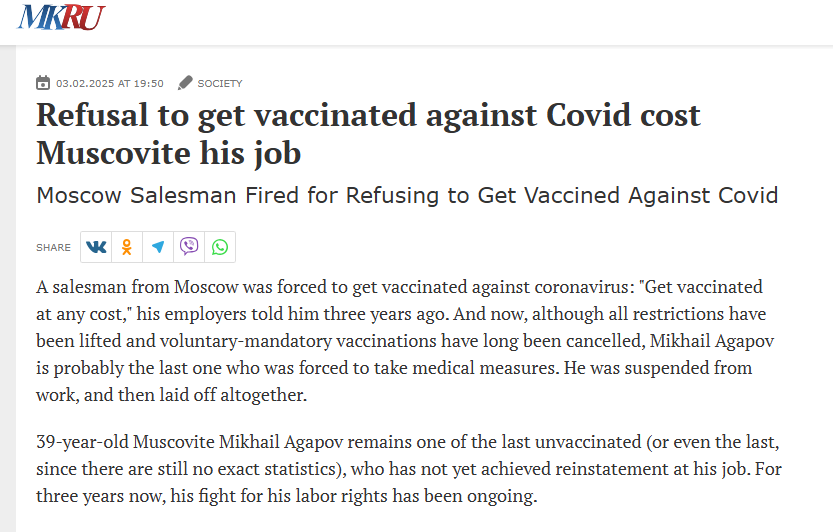
The Pandemic Agreement is a Pandora’s Box designed to usher in a “One Health” approach to “pandemics”. However, in its current form, the treaty does not give the WHO “any authority to direct, order, alter or prescribe national laws or policies, or mandate States to take specific actions, such as … impose vaccination mandates.”
In other words, the Russian delegation is blowing smoke when it stresses that Moscow is guided by “domestic laws, rules, and standards”. Tellingly, these homegrown public health policies are far more extreme than anything the WHO could forcefully impose on Russia.
But please don’t get the wrong idea: Moscow’s commitment to respecting national sovereignty has not stopped it from advocating for an international system for permanent biosecurity theater.
In April 2021, Russia unveiled plans to create a “Sanitary Shield” to protect its country from the threat of positive PCR tests. By 2030, dozens of bio-checkpoints will administer not-fit-for-purpose PCR tests to biohazards (people) entering the Russian Federation. The Shield will also allow Russia to expedite the creation of unproven genetic injections to combat the spread of positive PCR tests.
In keeping with its deep commitment to reduce the number of positive PCR tests, Moscow wants the entire world to use its very scientific, health-preserving Shield. TASS has the details:
Russian Finance Minister Anton Siluanov believes it is possible to create a global sanitary shield to combat threats in the healthcare sector. He expressed this opinion at a joint meeting of finance and healthcare ministers of the G20 countries.
As reported by the Finance Ministry’s press service on Saturday, during the meeting the minister shared his experience in creating a rapid response system to pandemics in Russia as part of the federal project “Sanitary Shield”, which involves creating a system for rapid diagnostics of infectious diseases, accelerated development of test systems and vaccines when new epidemiological threats arise. “We believe that a similar sanitary shield could be built at the global level,” Siluanov noted.
The head of the Ministry of Finance also stressed the need to prevent fragmentation of the global health system and maintain the central role of the World Health Organization (WHO) in it.
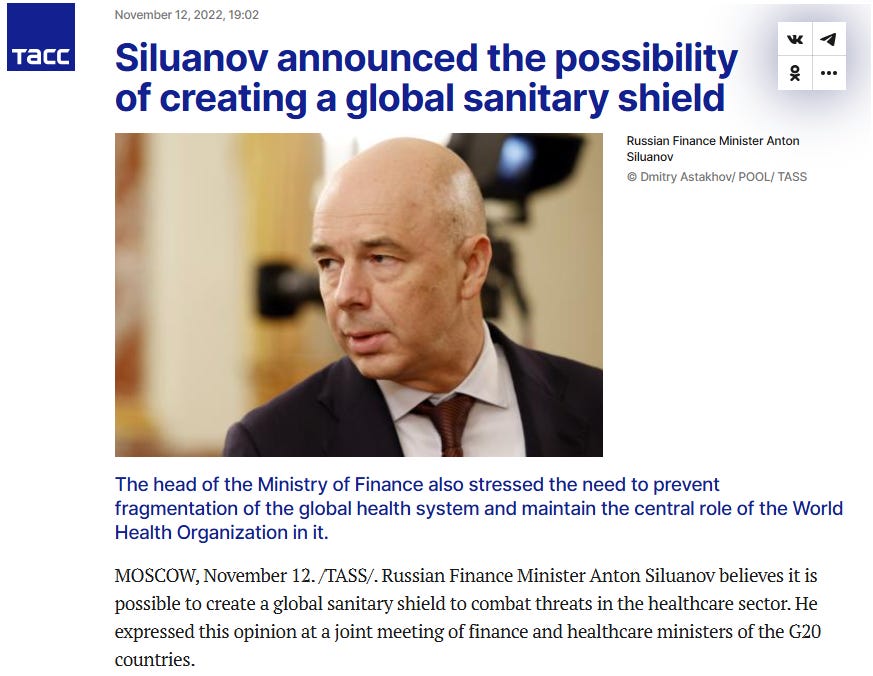
I have a question…
If BRICS advocates for a sovereign and independent Global South, and serves as a bulwark against the machinations of the collective West, why did BRICS nations express near-unanimous support for the Pandemic Agreement?
It’s a simple question: Why are members of the Global South (including BRICS members) among the most zealous supporters of the treaty?
In a joint statement issued after the Committee A vote, members of the WHO Africa Region said they “eagerly awaited” the adoption of the Pandemic Agreement, which they considered legally binding under the WHO Constitution—a radical position even for many western states that voted in favor of the treaty:
[The Pandemic Agreement] represents the first legally binding framework to address critical gaps that the International Health Regulations (2005) could not fully encompass … We believe the implementation of both instruments will enhance States’ capacity to address future health emergencies and pandemics.
[…]
Lastly, the Africa Region maintains that this instrument [the Pandemic Agreement] should be legally binding under Article 19 of the WHO Constitution. We envision a robust framework capable of fostering enhanced cooperation and coordination in bolstering global preparedness and response capacities.
(The statement was submitted by BRICS state South Africa on behalf of 40+ countries belonging to the Global South.)
Allow me to rephrase my question…
When Very Serious and Independent Internet Thought Leaders salivate over how BRICS boasts 45% of the world’s population, and 35% of global GDP, and half the world’s strategic marmalade reserves, etc., etc., why is there never any discussion about WHAT THIS ALLEGEDLY ASCENDANT GEOPOLITICAL POWER BLOC SUPPORTS, ADVOCATES FOR, LIKES A LOT, AND SO FORTH?
WHY IS DISCUSSION ABOUT BRICS VERY OFTEN VEILED IN A BUNCH OF MEANINGLESS BUZZWORDS AND STATISTICS, INSTEAD OF FAR MORE USEFUL INFORMATION SUCH AS:
BRICS OVERWHELMINGLY (!!!!!!!!!!!) SUPPORTS THE PANDEMIC AGREEMENT, BUT MOSCOW FEELS LEFT OUT BECAUSE IT KNOWS THAT WHEN THE “CAT FLU PANDEMIC” ARRIVES, IT WILL PROBABLY BE MUSCLED OUT OF THE mRNA CAT-SLURRY MARKET BY ITS TRUSTED WESTERN PARTNERS.
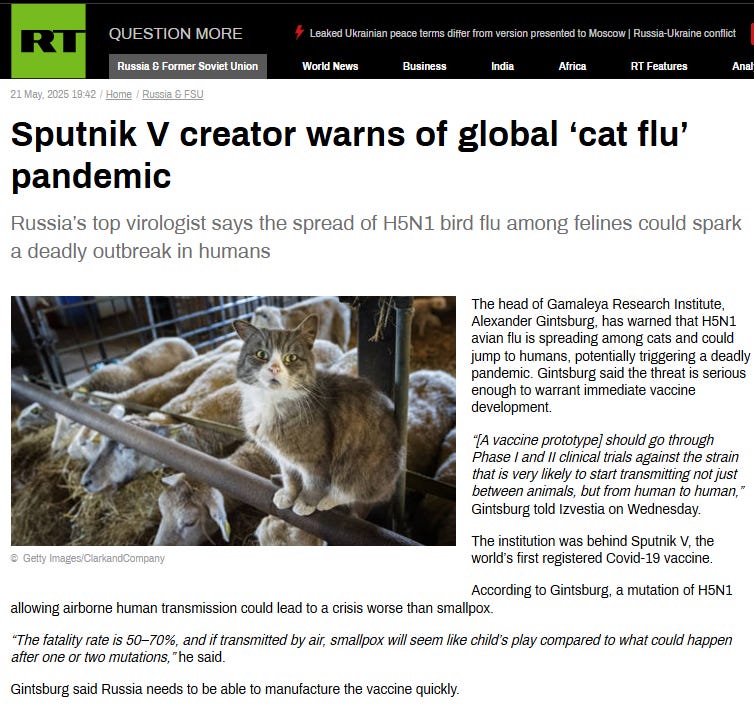
Thank you for reading and have a nice Saturday.

